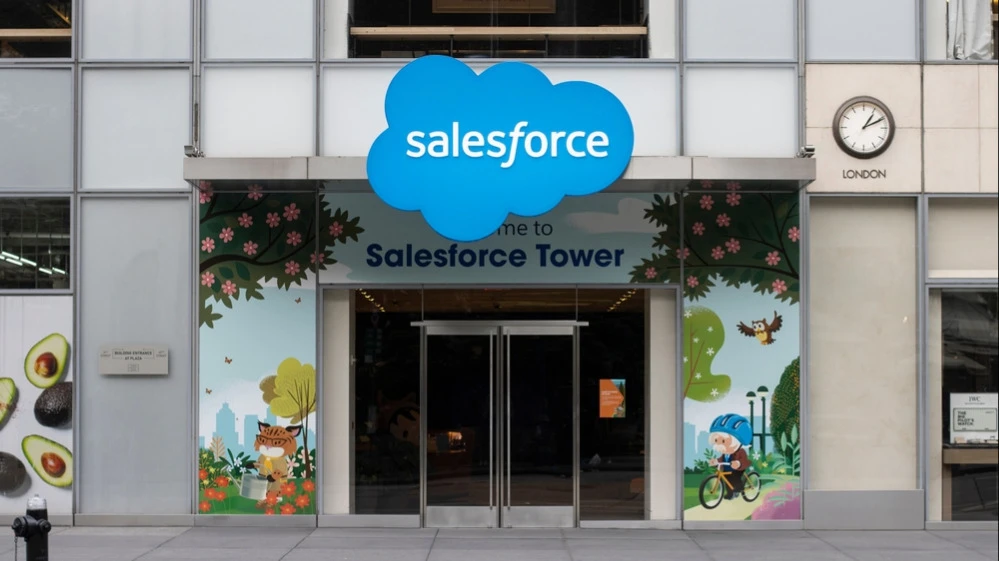Salesforce is one of the worst performing stocks in the Dow Jones. Why is it interesting to analysts again?
The company's papers are trading at their lowest premium in a decade

Despite the weak result in the Dow Jones index since the beginning of this year, the securities of the developer of CRM-systems Salesforce, may be of interest to investors, as they are cheaper compared to competitors, says Barron's. Quotes of the company have been falling since January, as market participants fear that artificial intelligence will take away revenue from classic software developers. At the same time, the threat to Salesforce worries them more than the prospects of other players, the publication notes. It suggests that Wall Street is underestimating the company's AI initiatives.
Details
Some fund managers and Wall Street analysts believe the worst is over for Salesforce, and the leader in CRM services could return to growth, Barron's notes. The company's stock has fallen 25 percent since the beginning of the year, the second worst performance of any member of the Dow Jones blue-chip index. The publication believes that the fall was excessive.
"Salesforce shares are trading at a 22 multiple to expected earnings, a 10-year low and well below the average multiple over the same period. It stands at 54," writes Barron's columnist Paul R. La Monica. - We're not saying the company still deserves such a high premium, as this quarter could prove challenging, with earnings forecast to grow only 8.6% year-over-year. But the current valuation may be too low given the outlook."
Salesforce's earnings should grow by more than 15% on average over the next few years, according to analysts' consensus expectations. That means the PEG ratio, which measures the ratio of price to earnings growth, is just 1.4. By comparison, Oracle, whose stock price has risen 41% since the beginning of the year, has a PEG ratio of 2.4, and Microsoft, which has added 19% to its capitalization, has a PEG ratio of 3.9.
This suggests that the market is far more concerned about the impact of AI on Salesforce than on its competitors, and may be underestimating the company's own initiatives in this area, including its Agentforce platform, La Monica emphasizes.
"Salesforce looks particularly interesting," Harbor Capital portfolio manager Justin Menne told Barron's. - The stock's valuation is compressed. But the company will succeed when it scales its AI products."
What worries investors
The software industry is worried about the widespread adoption of AI, which could impact developer profits. "There are concerns that spending on artificial intelligence will start to crowd out investments in traditional software," explained Barron's Alex Fitch, a partner and portfolio manager at Harris Associates, which owns Salesforce stock through the Oakmark Select fund.
This pressure can be felt in the sector's dynamics: the SPDR S&P Software & Services core ETF has declined by almost 2% since the beginning of the year. But the biggest concern is Salesforce, which is facing a clear threat from AI, according to the publication.
What Salesforce is doing
Salesforce is developing AI agents that independently solve routine tasks. The company also strengthened its position in the AI segment with an $8 billion deal to buy data management software developer Informatica, which complements previous acquisitions such as MuleSoft, Tableau and Slack.
Another driver could be the actions of activist fund Starboard Value. It boosted its stake in Salesforce by 400,000 shares in the second quarter. This investor, who first entered Salesforce's equity in 2022, could push CEO Marc Benioff to more aggressively launch new AI features, La Monica said. This approach has worked previously, with Salesforce's stock price nearly doubling in 2023. The combination of activist pressure and historically low valuation of securities may again lead to a sharp rise, the analyst suggests.
On Wall Street, many share this optimism: 47 of 58 analysts who track Salesforce shares recommend buying them, according to MarketWatch. The consensus target is $343.6, which implies a potential upside of more than 40% relative to current quotes.
This article was AI-translated and verified by a human editor
